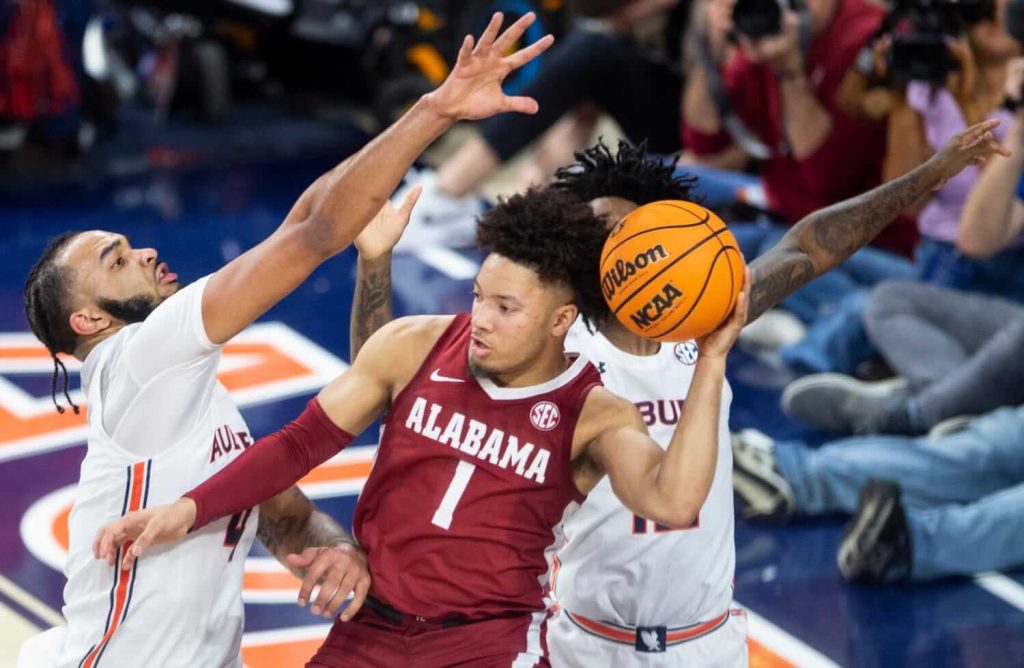Testy Alabama Committee Meeting Ends Without Vote on Gaming Bills
by Robert Linnehan in Sports Betting News
Updated Feb 29, 2024 · 6:32 AM PST
Alabama Crimson Tide player Mark Sears (1) passes out as Auburn Tigers take on Alabama Crimson Tide at Neville Arena in Auburn, Ala., on Saturday, Feb. 11, 2023. Alabama Crimson Tide defeated Auburn Tigers 77-69.A testy 40-minute long Senate Tourism committee meeting ended with no vote on Alabama gaming billsThe committee held off on calling for a voteChanges are likely coming to the gaming bills
An Alabama Senate Tourism committee meeting ended with no action taken on two comprehensive gaming bills this afternoon after a high-strung 40 minutes of discussion.
The scheduled public hearing for bills HB 151 and HB 152, which call for an expansive gaming package in Alabama, started nearly 20 minutes late. Several committee members expressed their displeasure with the delay and the expectation that they were to take action on the bills without first seeing their full pages.
However, it was mentioned in the meeting that changes are likely coming to the bills. Several committee members lamented that they have yet to see the proposed changes in full and could not in good conscious take a vote on the bills.
“I have not seen any legislation. I have not seen any substitute that has been rumored. I want to make it very clear to anyone that is listening to this mic, if anything comes from this bill I will move to table it in this committee. And if it does move forward? I’ll be a no. This is not how you run a government…this is not good government when you bring a bill that’s 130 to 140 pages long that nobody has seen,” Sen. Andrew Jones (R-10) said.
No Action Taken on Bills
Bills HB 151 and HB 152 call for the legalization of up to 10 casinos, in-person and online sports betting, and a state lottery to support Alabama education. HB 151 is the triggering mechanism for the bill, which requires a constitutional amendment be approved by Alabama voters during the 2024 November general election.
The House of Representatives approved HB 151 by a 70-32 vote and HB 152 by 67-31 vote.
Despite a call for the committee meeting to be adjourned and the public hearing not move forward, Committee Chairman Sen. Randy Price (R-13) ultimately decided to allow the hearing to move forward.
Several opponents of the bills, mainly from family values groups, spoke out against the dangers of expanded gaming in the state.
Kimberly Cook, a Vestavia Hills City Councilor, said expanded gaming and a proposed casino in nearby Birmingham will put the health, safety, and welfare of her constituents at risk.
“Sports betting apps advertise to kids and quite literally take their lunch money,” she said.
Upon the conclusion of the public hearing, Sen. Greg Albritton (R-22) said he would hold off on calling for a vote until each of the committee members had a chance to review any potential substitute bills in full.
“We should not vote on anything we have not seen, and we’re not going to. Looking around, I think we have the votes, maybe, Mr. Chair, to pass what we have out of committee today. I’m tempted to do something along those lines. However, I know that there have been hours of work trying to find a solution so we can find a path to a workable bill that’s comprehensive in nature, that will resolve all issues, that will gives us the caps, the controls, and the collections of revenues that we need here in Alabama so that we don’t have a rampant wild west out there,” he said.
The committee approved his motion to carry the bills forward. Albritton said compromise is needed on all sides to eventually get something done with the legislation and he wanted it known that he chose in good faith to delay a vote on this issue.
“If we’re going to get this done, we have to have cooperation and compromise on both sides. We cannot have separate people and individuals running through and running over this,” he said.
Gaming Bill Details
The bills, if approved by a three-fifths majority the Senate, will establish an Alabama Gaming Commission to license and regulate the conduct of all sports wagering, charitable gaming activities, lotteries, and casino gaming activities in the state. The bills will also create the Alabama Gaming Enforcement Division, which will include the power to police all gaming activities in the state and “work to eradicate unlawful gaming and gaming-related activities,” the legislators wrote.
Casinos will be taxed at a rate of 24% of net gaming revenue and 95% of total gaming revenue will be allocated to the state’s Gaming Trust Fund every month. A percentage of the revenues will then be distributed among municipalities where the casinos are located.
Casino licenses will be valid for a 15-year term. An extended initial license term could be granted by the gaming commission if the applicant proposes to make a minimum capital investment of $500 million at the proposed site. Casino license fees shall not be less than $5 million.
Sports betting will be taxed at 17% of net gaming revenue, with 90% of the revenue allocated to the Gaming Trust Fund and 10% to be allocated among each county commission to be used “exclusively for law enforcement purposes of the respective sheriff’s department.”
A state education lottery will also be created.
Fiscal estimates show that legalized gaming, casinos, and lottery through these bills can bring in between $935.6 million to $1.214 billion annually. This breaks down as follows:
Sports betting is estimated to be between $15 million to $42.5 million annuallyGaming revenue is estimated to be between $315 million and $492.2 million annuallyLottery revenue is estimated to be between $305.6 million to $379.4 million annuallyGaming compact revenue estimated at $300 million annually


